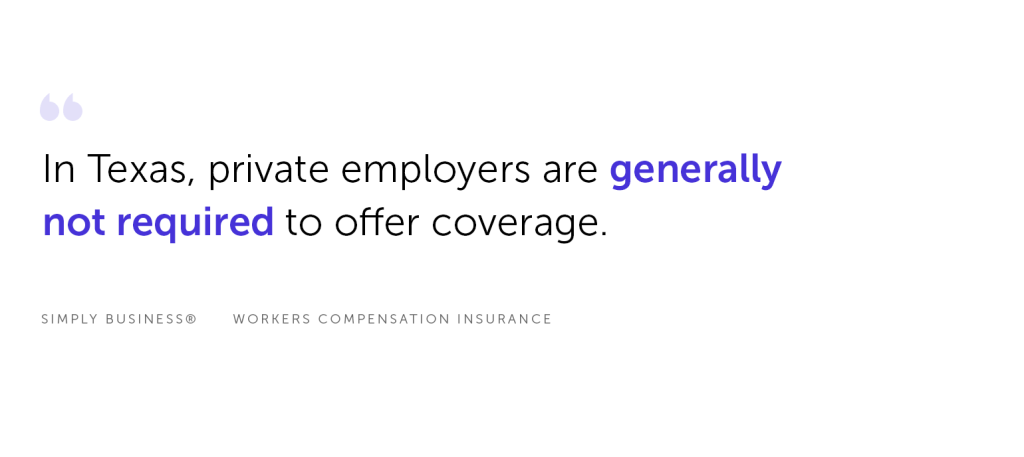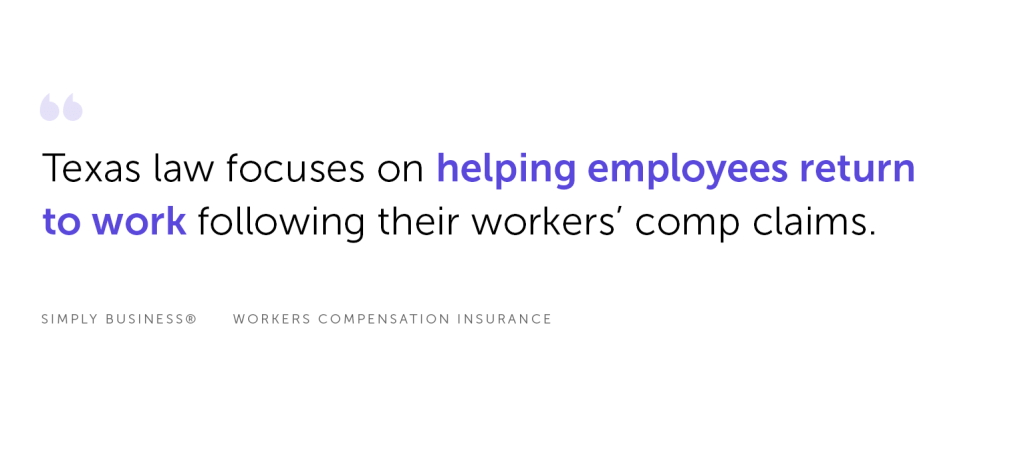Texas Workers’ Compensation Insurance
Are you a business owner in the Lone Star State? Check out our Texas workers’ compensation insurance guide.
Simply Business is pleased to provide tailored insurance options from:
Most small business owners know that workplace safety is a top priority. Not only does avoiding work-related injuries and illnesses protect your employees and yourself — it can also protect your business and legacy. Committing to consistent worksite maintenance and reducing potential hazards could be a great defense. However, it is impossible to eradicate risk completely.
Workers’ compensation insurance coverage can help in the event of an unpredictable incident. Workers’ compensation is insurance carried by employers to provide coverage for workers with work-related injuries and illness.
Workers’ compensation insurance benefits may include medical care reimbursement, as well as compensation for lost income, depending on the case. Some of the most common workers’ compensation claims include sprains, strains, broken bones, and concussions.
Workers’ compensation requirements can vary distinctly from state to state. As an employer, it is important to reference your state’s workers’ comp regulations to ensure your business adheres to local guidelines. Let’s take a look at how workers’ compensation is handled in Texas.

Does Texas Require Workers’ Comp Insurance?
While many states require employers to carry workers’ comp insurance if they have a certain number of employees — or even no employees — Texas workers’ compensation requirements are different. In Texas, private employers are generally not required to offer coverage. The primary exceptions to this rule are:
- Private employers contracting with government agencies
- Certain contractors may require subcontractors to carry workers’ comp
Texas workers’ comp is regulated by the Texas Department of Insurance, Division of Workers Compensation here.

Do I Need Workers’ Compensation Insurance in Texas?
According to Texas Workers’ Compensation rules, employers need workers’ compensation insurance only if they contract with government agencies or if a particular contractor requires it. Otherwise, employers are not required to carry workers’ comp in Texas.
However, regardless that it’s not required doesn’t mean it’s not worth carrying. There are several benefits to holding workers’ compensation coverage that are important to take into consideration.
Holding workers’ comp insurance in Texas protects you from being subjected to most lawsuits by injured employees.
The same Texas Department of Insurance guide previously cited also states that if you or your employee are unhappy with how the claim is resolved by the Division of Workers’ Compensation, your workers’ compensation insurance will cover legal fees for the appeal process. Additionally, Texas law puts limits on employer liability if the employer holds workers’ compensation insurance.
If an employer carries workers’ compensation insurance, they are required to inform employees and provide them with the name of the carrier.
Do I Have to Offer Workers’ Comp Insurance in Texas?
If a business doesn’t fall under the previously stated exceptions, then they do not need to offer workers’ compensation. There are, however, downsides to not carrying it.
While those who carry workers’ comp are protected from certain lawsuits, those who don’t carry it waive that immunity. If an employee sues, the employer cannot argue the following in court:
- That the employee was at fault.
- That another employee was at fault.
- That the injury was due to a danger the employee knew about but accepted.
The employer can also could end up footing the bill for damages if the employee is able to prove employer negligence.
Employers who don’t carry Texas workers’ comp coverage are referred to as non-subscribers. Non-subscribers are required to file an annual notice with the Division of Workers’ Compensation, as well as to post notices of their insurance status in their workplace and provide written notice to new employees that they are not covered by workers’ comp.
Self-Insured Workers’ Compensation in Texas
Certain employers may be eligible to self-insure. If a private employer doesn’t want to obtain Texas workers’ compensation insurance through an established carrier, self-insurance allows them to pay for claims out-of-pocket. They must, however, apply, qualify, and be approved by the Division of Workers’ Compensation in order to obtain self-insured status.
According to the Texas Department of Insurance, in order to qualify for self-insurance, an employee must meet specific requirements, including:
- Meet the required unmodified manual insurance premium for workers’ comp. You can find further details here.
- Financial statements that have been audited.
- A qualifying financial rating.
- Provide a security deposit of no less than $300,000.
- Obtain excess insurance of at least $5 million.
- Pay a non-refundable application fee of $1,000.
If an employer meets the requirements and their application is accepted, they will become a certified self-insurer and a member of the Texas Certified Self-Insurance Guaranty Association.

Can You Terminate an Employee on Workers’ Compensation in Texas?
Workers’ comp coverage generally affords additional protections to employees undergoing or considering a claim. While there may not be a law specifying that an employer can’t terminate an employee who’s involved in a workers’ comp claim in Texas, there are a few stipulations.
An important protection for workers’ comp recipients in Texas is Chapter 451. This Labor Code states that an employer legally cannot retaliate or discriminate against an employee for filing a claim or hiring a lawyer to assist with that claim. Any termination found to be in violation of this code may result in the following:
- The employer could be held liable for employee damages as a result of the termination.
- The employee may have the right to be reinstated in their position.
Returning to Work After a Workers’ Comp Claim
Texas law focuses on helping employees return to work following their workers’ comp claims. The general consensus is that employees recover more efficiently if they are able to perform useful work simultaneously. This work is often considered light duty.
If the employee refuses to complete the work assigned to them, it may result in their workers’ compensation benefits ceasing.
Are 1099 Employees Covered by Workers’ Comp in Texas?
A 1099 employee is an independent contractor, such as freelancers, consultants, and people whose work is project-based.
According to Texas law, if a subcontractor and a hiring contractor enter into a written agreement that states the independent contractor is not considered an employee of the hiring contractor and satisfies other requirements set forth in the statute, then the independent contractor would not be entitled to workers’ compensation benefits from the hiring party.
Workers’ Comp Drug Test Texas Policies
While Texas previously held a policy requiring any employer with a workers’ comp policy and 15 or more people on the payroll to have a drug-free workplace, that policy was repealed in 2005. However, even if it is still common practice for workplaces to maintain a similar policy at the employer’s discretion a drug test is not required in order to receive benefits from workers’ compensation in Texas.

Texas Workers’ Comp Insurance Verification
To verify an employer’s workers’ compensation insurance status, you can check with the Texas Department of Insurance. They provide a running list of known non-subscriber employers.
To verify a subscribing employer’s workers’ comp insurance, an official search function can be found here.
A file containing all certified self-insurers in the state of Texas can be found here.
Cost of Workers’ Comp Insurance in Texas
Similar to many other states, Texas has a workers’ compensation insurance classification system. The system is designed to classify businesses into categories based on their respective levels of risk. A full list of industries and their class codes is available through the Texas Department of Insurance.
In addition to the risks involved in an industry, a number of other factors could impact your insurance rates. This may include the number of employees, amount of payroll, and even the employer’s loss history.
We’re Here to Help
Texas workers’ compensation insurance can be complicated. Insurance has a lot of terminologies, and each state has different requirements and recommendations. It can be overwhelming. We can help with that. Your business is important, and we want to help you keep it safe.
Simply Business partners with small business owners every day to help them shop for insurance quotes and find coverage that works for them. Start your workers’ compensation insurance quote with us today. Tell us what’s important to you and to your business, and we’ll take it from there.
Employee Benefits for Texas Workers’ Compensation
If their employer carries workers’ compensation insurance, employee benefits may be available if a workplace injury occurs. While the benefits will vary by case and may be subject to state limits, depending on what the employee’s needs are, the general benefits include the following:
- Medical benefits for treatment of workplace injuries.
- Disability income for a period determined by Texas workers’ compensation law.
- Burial expense compensation for workplace fatalities.
- Death benefits for a deceased employee’s dependents.

Who is Exempt from Workers’ Compensation Insurance in Texas?
According to the Texas Workers’ Compensation Act, private employers are not required to carry workers’ comp insurance in Texas unless they contract with a government entity or work with contractors who require it. As a result, most employers are exempt from carrying coverage, provided they cooperate with regulations from the Division of Workers’ Compensation.
Texas Workers’ Comp Forms
Workers’ compensation insurance paperwork in Texas can seem confusing. Below are some useful workers’ compensation forms for Texas employers and contractors to get you started.
Texas subcontractors’ workers’ comp waiver form
To establish a workers’ compensation waiver or other agreement with a subcontractor, forms can be found here.
Texas workers’ comp mileage reimbursement form
To receive reimbursement for travel costs, complete this form and send it to your insurance carrier.
Texas Department of Insurance, Division of Workers’ Compensation Form 85
Complete this form to confirm that a subcontractor and their employees do not fall under the general contractor’s workers’ comp coverage.
Workers’ Comp Information in Other States
Simply Business has state information for workers’ compensation insurance in California, Colorado, Florida, Georgia, Illinois, Maryland, Minnesota, New Jersey, New York, North Carolina, Pennsylvania, Texas, Wisconsin.